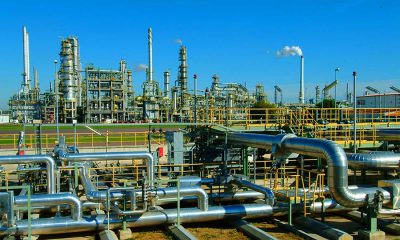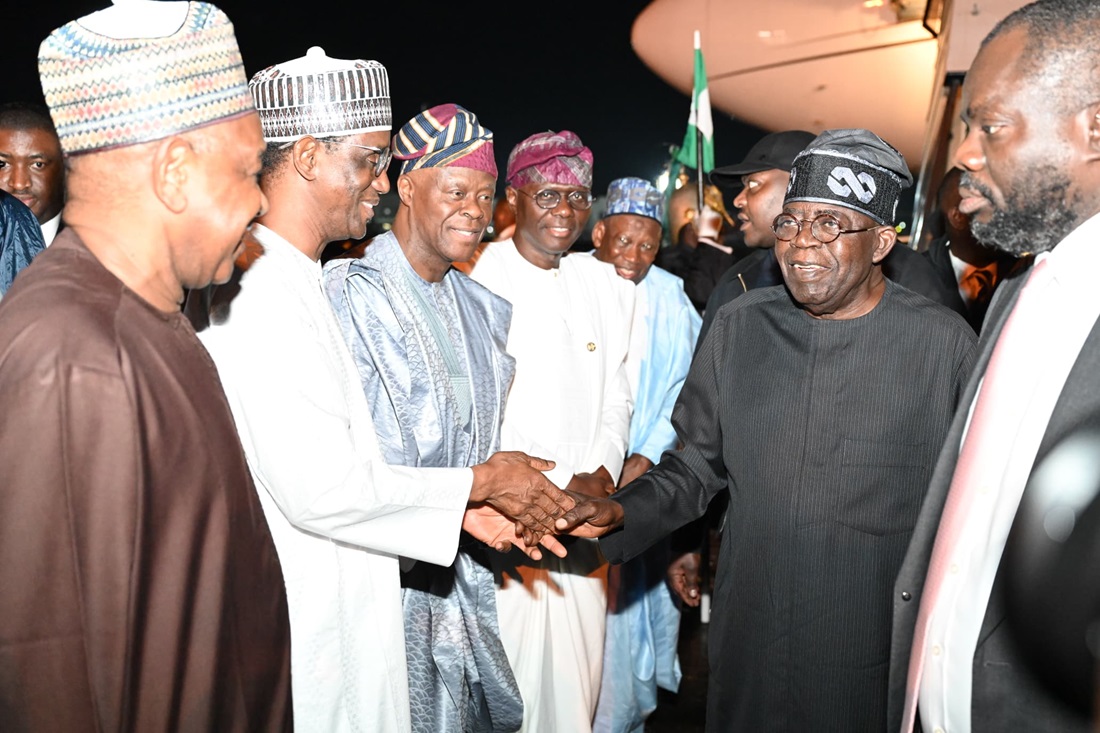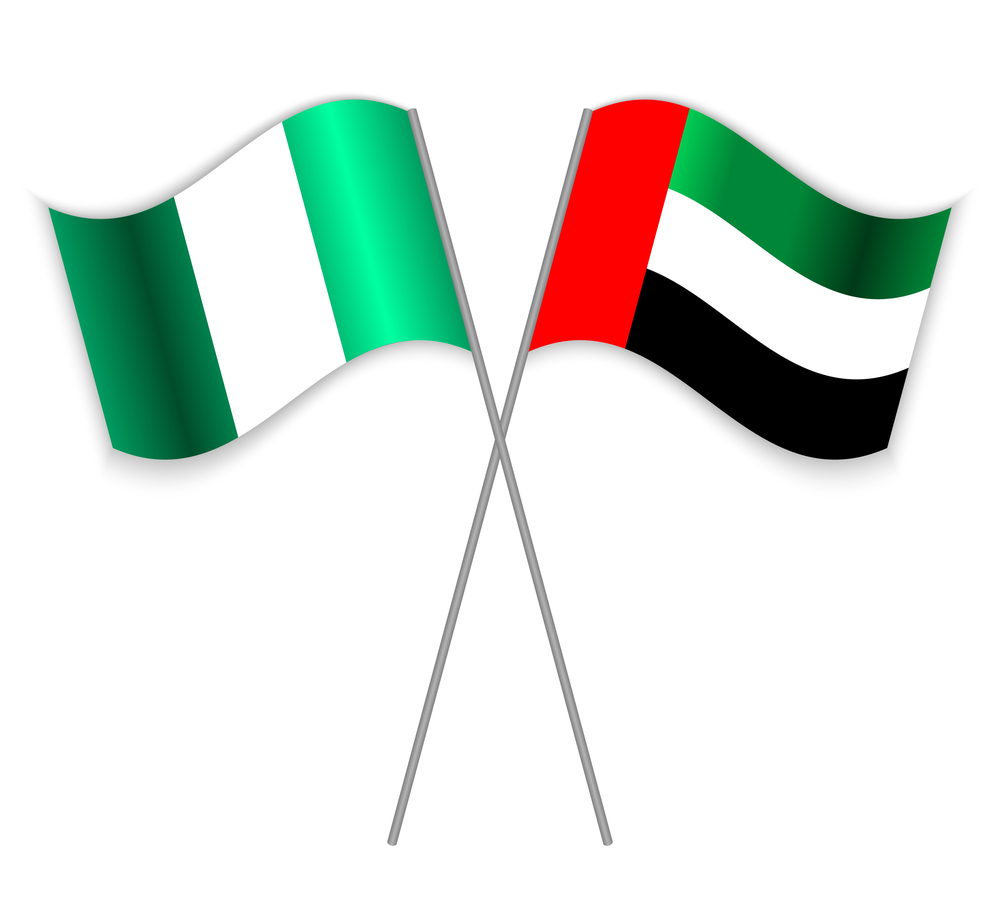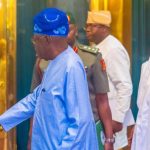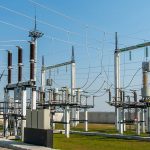Economy
Shift in Geopolitical Relations: Russia’s Roadmap to Nigeria, ECOWAS and Africa
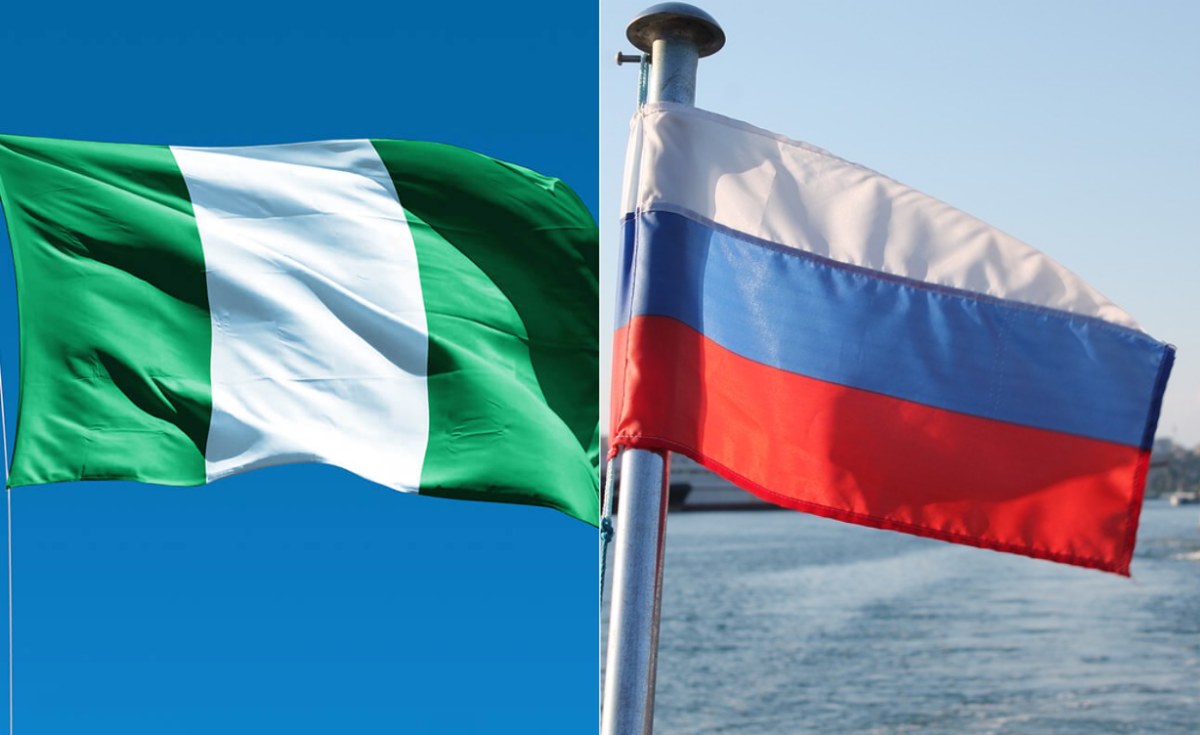
By Professor Maurice Okoli
The growing US-China rivalry and Russia-Western allies’ geopolitical tension have shaken the international peace and security system’s foundation and significantly shaped Russia’s diplomacy with Africa. While that seems to be the general trend across the board, the Federal Republic of Nigeria is also getting highly renewed attention from Moscow. Historically Nigeria, like a number of African states, has had relations from the Soviet times and still maintains traditional relationships after the Soviet’s collapse in 1991. Nevertheless, it is interesting to explicitly note that a new wave of democratic change has also blown all over Africa. We can convincingly point to the fact that old ideological friends of the Soviet Union changed camps and transformed in favour of the capitalist-democratic model, in line with the changing political dynamics inside Africa and around the world.
In practical terms, the Soviet Union offered enormous assistance during the decolonization process of African countries in the late 1950s and early 1960s, and the Kremlin’s policy, at that period, for the newly liberated African countries included:
To gain a lasting presence in the African continent,
To have a voice in African affairs,
To undermine Western influence in the African continent by equating capitalism with imperialism, and
To keep communist China out of the African continent.
In pursuit of its foreign policy agenda, the Soviet Union maintained diplomatic relations between Nigeria and many on the continent. There were 48 diplomatic offices across Africa. Nigeria established diplomatic relations on November 25, 1960, after it had attained political independence from Britain. The mission was formally opened in 1961.
There are noticeable bits of historical landmarks between Nigeria and Russia. Olusegun Obasanjo visited Russia in 2001. That was followed by Muhammadu Buhari in 2019. However, in June 2009, Dmitry Medvedev, president of Russia, visited Nigeria for the first time and held topmost state-level talks on possible nuclear energy, oil exploration and military cooperation. There were talks also focusing on establishing a petrochemical plant in Nigeria. There was also a declaration on principles of friendly relations and partnership between Nigeria and the Russian Federation.
Russia’s second-largest oil company, and privately controlled Lukoil, has gone back and forth these several years with plans to expand its operations in Nigeria and several West African countries. There has been a long-dead silence after Gazprom, the Russian energy giant, signed an agreement with the Nigerian National Petroleum Corporation (NNPC) on the exploration and exploitation of gas reserves with a new joint venture company known as NiGaz Energy Company.
Despite the complexities and obstacles, Nigeria is still high on Russia’s agenda for reviving multifaceted business ties, at least to share the market and take up opportunities similar to external players such as the United States, Europe and China. We sincerely acknowledge efforts by Russians now gearing up to revamp the Ajaokuta Iron and Steel Complex, which was abandoned after the collapse of the Soviet Union three decades ago, and further take up energy, oil and gas projects in Nigeria, as well as facilitate trade between Nigeria and Russia.
Further to the above, there could be specific points of focus in the current relations: The strategic point of convergence between Moscow and Abuja is stability in the West African region, which is vital for both countries in their interests. It could best be achieved through ensuring security, boosting economic development, expanding tentacles in energy and infrastructure projects and raising cooperation with the regional bloc – the Economic Community of West African States (ECOWAS).
Suffice it to say that Russia’s passion for humanitarian cooperation is strongly recommended here. This will help sustain its traditional sphere of influence in the western region of Africa. The main reasons are that Nigeria is considered the economic powerhouse. Ghana now hosts the headquarters of the African Continental Free Trade Area (AfCFTA), spanning 54 states over the next years with the potential to unite more than 1.3 billion people in a $2.5 trillion economic bloc. It has the potential to generate a range of benefits through supporting trade creation, structural transformation, productive employment and poverty reduction. The AfCFTA opens up more opportunities for both local African and foreign investors from around the world.
Both African and foreign policy experts argue that African countries need to support meaningful dialogue and take steps toward addressing the economic dimensions in the continent, and this must necessarily reflect in their relations with potential external partners while, at the same time, maintaining their territorial integrity and political independence. We strongly believe that African economic diplomacy and partnerships could be raised to appreciably new levels the Russia-Africa relations. This is where I shared my views with both foreign and our African experts that these measures will contribute tremendously, in pursuit of the economic integration of our continent, towards the attainment of the well-known vision: Agenda 2063, the Africa We Want.
Egypt, Nigeria, and South Africa are the biggest economies on the continent, and Nigeria, for example, plays a major role in the West African region. The Nigerian economy is based on private enterprise, but the state participates in many ways. That is why Russia has to redirect its focus to the private sector to enhance its economic profile. In this case, Nigeria, Ghana, Cote d’Ivoire (Ivory Coast) and other countries have enormous potential to cooperate with Russia in the West African region. According to reports, on different occasions, former Vice President Yemi Osinbajo expressed keen interest in developing bilateral cooperation and spoke frankly about the need to increase the presence of Russian companies in Nigeria.
Three key factors are at work here for Russia to get a foothold in West Africa. First, Russia is seen as the provider of security, and Russia’s defence capabilities continue to play a crucial role in maintaining stability in the region. One more point here is the French-speaking Sahel-5 (Burkina et al.) is nearly under the control of Russia. Reports pointed out that cooperation among forces from the so-called G5 countries – Burkina Faso, Chad, Mali, Mauritania and Niger – remains difficult given the anti-French sentiments in the country, forcing under-equipped local armies to quickly step up their game against Islamist rebels in the volatile Sahel region.
With high interest, Russians are consistently pushing for military-technical cooperation. For Nigeria, Russian military equipment supply could be a high-value addition to the fight against the notorious Boko Haram, which threatens West African states. Many experts say conflict resolution should be coordinated and undertaken within the framework of multilateralism, which, of course, falls within Russia’s interest in forging relations with respective Security Councils of ECOWAS, the African Union and the United Nations.
Second, an opportunity to have market access to the West African region if potential Russian investors decide to locate some kind of production with the rules and regulations put in place under the African Continental Free Trade Area (AfCFTA). Unlike Russia, United States investors look forward to exploring several opportunities in the African Continental Free Trade Area (AfCFTA), a policy signed by African countries to make the continent a single market. Russian investors could similarly pursue public-private partnerships that support Russian and African businesses, including women-owned and led Small- and Medium-Scale Enterprises (SMEs).
Third, to carefully look at optional ways of utilizing civil society and private sector organizations. If Russia wants to play a pivotal role in advancing its economic influence, it has to navigate, leverage or make inroads into the private sector. Understanding these factors is crucial in formulating policies and appropriate mechanisms for realizing them. Worth to say that efficiency and effectiveness must reflect in its policy implementation. On the other hand, the shifting geopolitical landscape dictates new refined strategies. It also implies the ability to choose the multi-alignment dimension of countries rather than just dealing with a few in the region.
Notwithstanding multiple challenges with pursuing general policy goals in Africa, I would also note here in this article that Russia has maintained a traditional friendship, particularly with Nigeria and broadly with West Africa, so it is important that some focus be given to issues raised here at the forthcoming Russia-Africa summit. The critical focus areas are agriculture, energy, oil and gas, telecommunications, healthcare, transport, financing, marine exploration, aerospace, and other areas where Russian technology can have a comparative advantage.
Many Russian companies such as Lukoil, Gazprom, Rosatom and Rosneft are some of Russia’s energy and power industries actively engaged in Nigeria, Egypt, Angola, Algeria and Ethiopia. It must be stressed that in 2018, “Nigerian oil and gas Exploration Company Oranto Petroleum announced that it would be cooperating with Russia’s largest oil producer, Rosneft, to develop 21 oil assets across 17 African countries.” Unfortunately, this has not materialized due to Rosneft’s lack of interest in doing business in Africa. Additionally, Russian Rosatom has signed nuclear energy agreements with 18 African countries, including Nigeria, Egypt, Ethiopia and Rwanda, to address the power needs of those countries.
The Russian strategic policy interest in Africa and given the strong limitation of its current capability, according to Paul Stronski, one-time Senior Analyst for Russian domestic politics for the U.S. State Department Bureau of Intelligence and Research, “in many respects, Russia’s re-emergence in Africa, is an earnest attempt to resume relations where they were left when the Soviet Union departed the scene.” Paul Stronski further argues, “In sub-Saharan Africa, Russia’s priority is on exploiting new commercial opportunities and securing diplomatic support for its positions in multilateral institutions.”
The trade volume between Russia and Africa was $ 14.5 billion annually in 2020. However, this figure pales insignificance when compared with China, whose trade with Africa has attained $ 165 billion per annum during the same period and $ 254 billion in 2021, even with its late-comer status in Africa. This is to say that the doubling of trade relations within the next five years between Africa and Russia, as stated by Vladimir Putin in 2019, Sochi is not only a vision in the right direction of growing Russia’s partnership with Africa but also a desirable imperative.
In this sense, a new partnership with Africa could be defined not in terms of ideology but by alternative economic and developmental options which give Africa competitive parity. There are two distinctive initiatives which are appreciated: (i) President Vladimir Putin’s debt cancellation of twenty billion dollars ($20 billion) owed to Russia by African countries, which, in his very own word, “was not only a mark of generosity but also a manifestation of pragmatism.”
(ii) The systematization of regular summits. The joint declaration says, “At the initiative of African participants, a new dialogue mechanism – the Russia-Africa partnership forum – has been created. Top-level meetings will occur within its framework once every three years, alternately in Russia and African states. And, the foreign ministers of Russia and three African countries – the current, future and previous chairpersons of the African Union – will meet for annual consultations.”
The two sides have set goals and tasks for further developing Russia-Africa cooperation. They moved from an “ad hoc approach” and often controversial decision-making modalities to “a more comprehensive structured long-term policy plan” dealing with relations.
Beyond the summit, it is necessary to follow up on the concrete decisions as these will give a new impetus to the wide-ranging and long-term multifaceted relations with the countries in West Africa. Ghana, Nigeria and a few countries are already traditional markets for foreign producers and investors, including the United States, Europe, China, India, and even the Gulf states. Ghana and Nigeria open wide windows and doors to the real African market, beginning with the formidable Economic Community of West African States (ECOWAS) regional market.
“Today, for instance, Nigeria offers Russia the advantage of that cheap and robust labour. Given Russia’s recent experience of sanctions by America and its Western allies, a new model of doing business with Africa through investment has become not only sustainable but also imperative.” This was argued by Professor Shehu Abdullai Yibaikwal, Ambassador Extraordinary and Plenipotentiary of the Federal Republic of Nigeria, with concurrent accreditation to the Republic of Belarus. In his academic lecture at the Diplomatic Academy of the Russian Federation, perhaps one of the sectors where this model of doing business can be symbiotically harnessed is the field of agriculture and its value chain as a result of the steep rise in the large African market and the projected certainty of huge returns on investment in this sector.
Russia has expressed deep interest in Nigeria, highly pledging to build nuclear power plants, petroleum pipelines, railways and infrastructure. Unfortunately, these corporate plans have not been realized; Russia sees instability or neo-colonialism as factors impeding its investment. Then there are also the project financing and legal aspects that must be mutually resolved.
Our part is to ensure sustainability by making partnerships more reliable, workable and long-termed. We still have skyline hope and optimism for building back better relations between the two countries, and most importantly within the context of the Declaration “On the Principles of Friendly Relations and Partnership between the Russian Federation and the Federal Republic of Nigeria” signed as far back in 2001, and the multilateral cooperation that was signed between Russia and Nigeria by both leaders at the first Russia-Africa Summit held in Sochi. The forthcoming second summit in July 2023 also signals Russia’s practical preparedness and commitment to work based on a single rule book for trade and investment and towards sustainable development growth across Africa.
To finalize this article, we should refer to the quote by Egyptian President Abdel Fattah el-Sisi, Chairperson of the African Union (AU) in 2019 and co-chair of the first Russia-Africa Summit: “Our declaration has reaffirmed the goals of Agenda 2063 and the 2030 Agenda for Sustainable Development. We have approved a ministerial mechanism for promoting dialogue and partnership. We appreciate all these moves and believe they have created a solid foundation for further developing Russian-African relations.” Aware of this common responsibility, the Russian and African sides will continue coordinating their efforts to monitor the implementation of the documents adopted at the summit. This meets the desires and aspirations of African states and the Russian Federation.
Professor Maurice Okoli is a fellow at the Institute for African Studies and the Institute of World Economy and International Relations, Russian Academy of Sciences. He is also a fellow at the North-Eastern Federal University in Russia.
Economy
Tinubu Seeks World Bank Support to Boost Agriculture, Economic Reforms
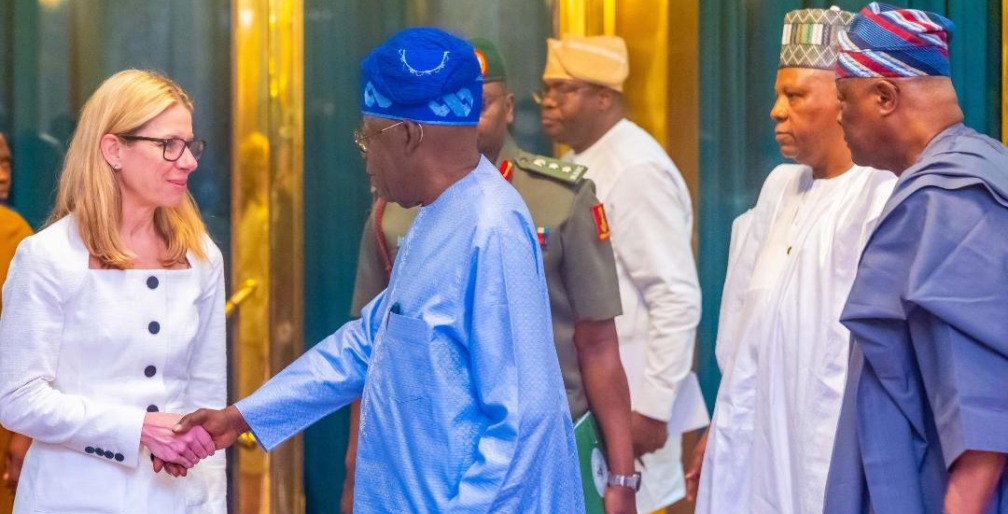
By Adedapo Adesanya
President Bola Tinubu has called on the World Bank to support Nigeria’s ongoing economic reforms, with a focus on agriculture, youth employment, and private sector growth.
The president sought this assistance when he received a delegation from the World Bank led by Anna Bjerde, Managing Director of Operations, at the State House, Abuja on Tuesday, noting that the bank’s support will boost his administration’s strategy to strengthen the economy and expand opportunities for Nigerians.
“Since we went into this tunnel of reform, we have our hands on the power and we’re never going to look back. Initially, it was painful and difficult, but those who win are not the ones who give up in difficult times,” Mr Tinubu said.
The president highlighted the importance of mechanization and modernization of agriculture to increase productivity and create opportunities for Nigeria’s large young population.
“We have mechanization centers to help farmers with improved seedings and fertilizers to enhance their programs. The goal is to move farmers from small-scale holders to large cooperatives that can create opportunities for Nigerians,” he explained.
Mr Tinubu also pointed to the petrochemical sector and other domestic industries as areas where the government is working to improve outputs and strengthen local markets. He stressed that reforms are continuous and must be grounded in transparency, accountability, and stability.
“The first reaction to reforms was high inflation, but it has come down dramatically, and the Naira is now stable. We want to help investors operate with ease, reduce bureaucracy, and develop the skills of our people,” he said.
On her part, Ms Anna Bjerde commended the administration for its consistent and steady approach to reforms over the past two years. She highlighted that Nigeria has become a global example of reform implementation, giving confidence to investors and policymakers worldwide.
“The results achieved in the last two years are commendable. Your steady communication of the importance of reforms has given confidence and clarity, and there is no turning back,” Ms Bjerde said.
She emphasized the importance of job creation, particularly for Nigeria’s youth, noting that Africa’s young population is growing rapidly and that SMEs are central to employment generation.
“Agriculture is a huge part of the economy and a major employer. Innovations in mechanization, cooperatives, value-chain development, and infrastructure can be scaled to create more opportunities,” Ms Bjerde said.
She also highlighted the World Bank’s financial support for Nigeria, including public sector financing of $17 billion, private sector support of $5 billion through the International Finance Corporation (IFC), and investment guarantees exceeding $500 million. These instruments are aligned with Nigeria’s reforms, including trade, digital initiatives, and inflation management, to stimulate private sector growth and human development.
“We want to work with Nigeria to accelerate growth, improve access to finance for SMEs, and support early childhood development as part of a comprehensive human development strategy,” she added.
Economy
OTC Securities Exchange Rises 0.96% to 3,641.30 Points

By Adedapo Adesanya
The NASD Over-the-Counter (OTC) Securities Exchange appreciated by 0.96 per cent on Tuesday, February 3, boosting the Unlisted Security Index (NSI) by 34.54 points to 3,641.30 points from the 3,606.76 points it ended a day earlier.
Equally, the market capitalisation of the trading platform was up during the session by N20.67 billion to end N2.178 trillion from the N2.158 trillion it ended on Monday.
The expansion witnessed by the OTC securities exchange yesterday was buoyed by the gains printed by four stocks on the bourse, with Central Securities Clearing System (CSCS) Plc up by N4.00 to sell at N44.00 per unit versus the previous day’s N40.00 per unit.
Further, Air Liquide Plc increased by N1.86 to end at N20.49 per share compared with Monday’s closing price of N18.63 per share, Afriland Properties Plc appreciated by 35 Kobo to N14.00 per unit from N3.65 per unit, and UBN Property Plc added 1 Kobo to settle at N2.20 per share, in contrast to the preceding day’s N2.21 per share.
On the flip side, there were two price losers led by FrieslandCampinaWamco Nigeria Plc, which shed 4 Kobo to close at N63.50 per unit compared with the previous day’s N63.54 per unit, and Geo-Fluids Plc lost 3 Kobo to finish at N6.81 per share compared with the N6.84 per share it traded in the preceding session.
Data showed that the volume of securities bought and sold by investors grew by 82.5 per cent to 7.0 million units from 3.9 million units, and the value of securities jumped by 5.2 per cent to N37.9 million from N36.0 million, while the number of deals decreased by 15 per cent to 34 deals from 40 deals.
CSCS Plc remained the most active stock by value (year-to-date) with 15.9 million units sold for N649.0 million, the second spot was taken by FrieslandCampina Wamco Nigeria Plc with 1.7 million units worth N110.9 million, while the third position was occupied by Geo-Fluids Plc with the sale of 11.1 million units for N73.1 million.
The most traded stock by volume (year-to-date) was still CSCS Plc with 15.9 million units exchanged for N649.0 million, followed by Mass Telecom Innovation Plc with 12.7 million units sold for N5.1 million, and Geo-Fluids Plc with 11.1 million units traded for N73.1 million.
Economy
Naira Firms to N1,372/$1 at Official Market, N1,455/$1 at Black Market
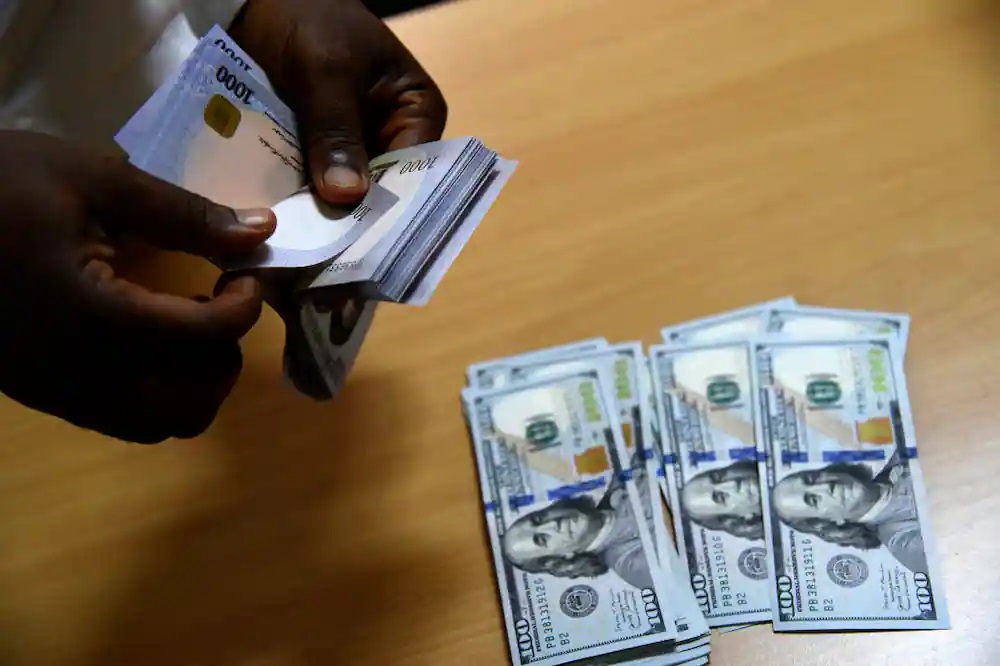
By Adedapo Adesanya
The Naira firmed up against the US Dollar in the various segments of the foreign exchange (FX) market on Tuesday, February 3, 2026, on the back of improved forex liquidity.
In the black market window, the local currency improved its value against the Dollar during the session by N10 to sell for N1,455/$1 compared with the previous day’s rate of N1,465/$1, and at the GTBank FX counter, it gained N33 gain to close at N1,386/$1 versus Monday’s closing value of N1,419/$1.
In the Nigerian Autonomous Foreign Exchange Market (NAFEM), the domestic currency appreciated against the greenback by N17.45 to trade at N1,372.91/$1, in contrast to the preceding session’s N1,390.36/$1.
In the same vein, the Nigerian currency chalked up N21.92 against the Pound Sterling yesterday in the official market to quote at N1,877.59/£1 compared with the N1,899.51/£1 it was exchanged a day earlier, and gained N24.76 against the Euro to settle at N1,619.76/€1 versus N1,644.52/€1.
The appreciation seen indicates that available supply is mopping up demand even without any intervention from the Central Bank of Nigeria (CBN) in recent weeks, showing that market-driven currency framework is driving a stronger Naira.
Enhanced price discovery following plans by the apex bank to undertake a comprehensive revamp of the FX manual is acting as a pillar of support.
At a recent forum, the Deputy Governor, Economic Policy, CBN, Mr Muhammad Sani Abdullahi, disclosed that the bank was revamping the manual, a key regulatory document used by banks for export proceeds and other foreign trade-related transactions.
According to him, the document was already undergoing significant reforms aimed at aligning market operations with current economic realities.
Mr Abdullahi explained that the revised manual would introduce clearer rules, stronger oversight and improved processes to support transparency and efficiency in the FX market.
He said the reforms are expected to close loopholes, reduce uncertainty for market participants, and support a more orderly functioning of the foreign exchange system.
Also, Nigeria’s external reserves, which provide the CBN with the capacity to support the Naira, have continued to rise, reaching $46.59 billion as of 2 February 2026, according to CBN data.
In the cryptocurrency market, most prices still remained down as sentiment among short-term traders remaining cautious after thin liquidity and heavy liquidations pushed prices sharply lower.
Global crypto investment products saw $1.7 billion in outflows last week, marking the second consecutive week of heavy redemptions, with Solana (SOL) down by 5.2 per cent to $98.41.
Further, Bitcoin (BTC) depreciated by 2.4 per cent to $76,638.44, Binance Coin (BNB) slumped by 2.0 per cent to $761.78, Ethereum (ETH) dropped by 1.9 per cent to $2,277.16, Ripple (XRP) declined by 0.6 per cent to $1.60, and the US Dollar Tether (USDT) lost 0.1 per cent to sell at $0.9985.
However, Dogecoin (DOGE) improved by 1.7 per cent to $0.1084, Cardano (ADA) expanded by 1.2 per cent to $0.2868, and Litecoin (LTC) increased by 0.9 per cent to $60.63, while the US Dollar Coin (USDC) remained unchanged at $1.00 apiece.
-

 Feature/OPED6 years ago
Feature/OPED6 years agoDavos was Different this year
-
Travel/Tourism9 years ago
Lagos Seals Western Lodge Hotel In Ikorodu
-

 Showbiz3 years ago
Showbiz3 years agoEstranged Lover Releases Videos of Empress Njamah Bathing
-

 Banking8 years ago
Banking8 years agoSort Codes of GTBank Branches in Nigeria
-

 Economy3 years ago
Economy3 years agoSubsidy Removal: CNG at N130 Per Litre Cheaper Than Petrol—IPMAN
-

 Banking3 years ago
Banking3 years agoSort Codes of UBA Branches in Nigeria
-

 Banking3 years ago
Banking3 years agoFirst Bank Announces Planned Downtime
-

 Sports3 years ago
Sports3 years agoHighest Paid Nigerian Footballer – How Much Do Nigerian Footballers Earn


